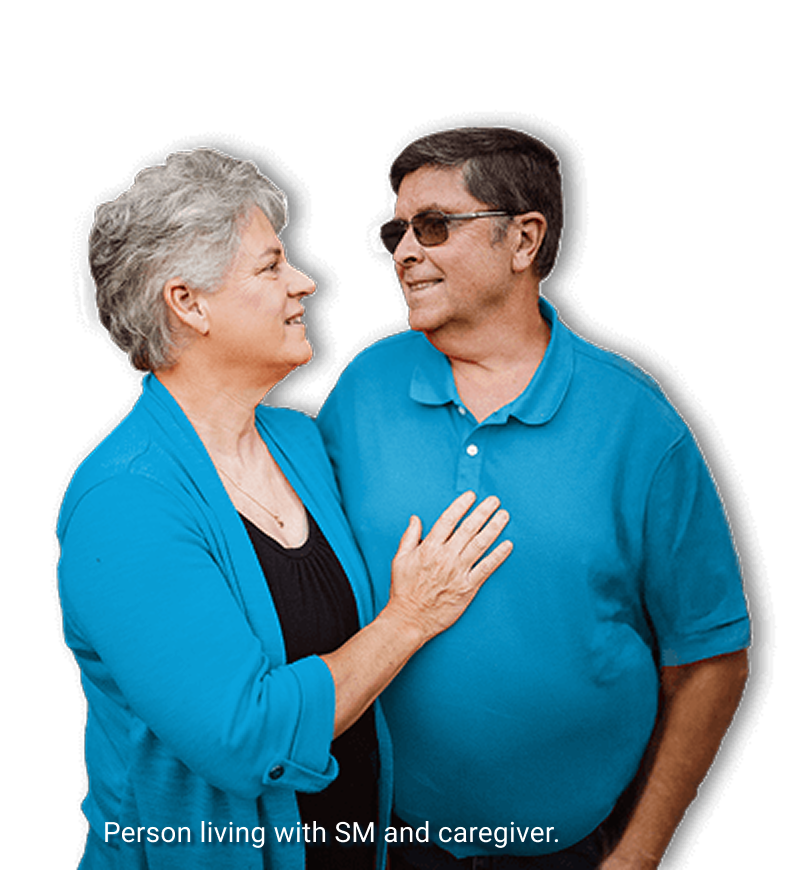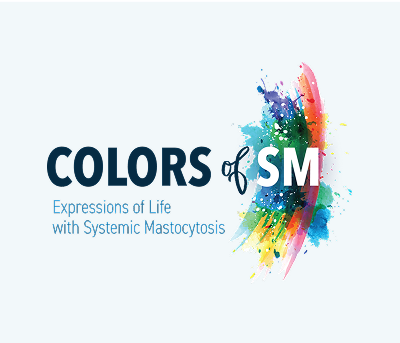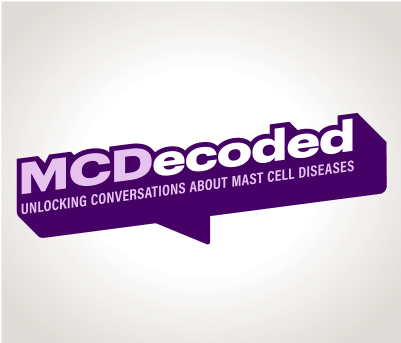Understanding SM
Systemic mastocytosis (pronounced “mass-toe-sigh-TOE-sis”), or SM, is a rare chronic condition caused by the buildup of abnormal mast cells. These cells are part of the immune system and help protect the body; however, in SM, overactive abnormal mast cells accumulate in excess and can trigger a wide range of symptoms. These may include skin lesions, bone pain, fatigue, diarrhea, and even life-threatening reactions such as anaphylaxis. Symptoms can vary from person to person, are often unpredictable, and may be triggered by such things as temperature changes, fragrances, certain foods, or stress.
In SM, these mast cells can build up in different parts of the body, including the skin, liver, spleen, bone marrow, and digestive tract.
SM is a rare disease that affects up to
5,000adults
A retrospective study shows that SM might be more common than we previously thought.
In most people with SM, the condition is caused by the KIT D816V mutation. This means there is a small change in a part of their DNA called the KIT gene.
References: 1. Bergström A, et al. Acta Oncol. 2024;63:44-50. 2. Cohen SS, et al. Br J Haematol. 2014;166(4): 521-528. 3. Van Doormaal JJ, et al. J Allergy Clin Immunol. 2013;131(5):1429-1431. 4. Brockow K. Immunol Allergy Clin North Am. 2014;34(20):283-295.
SM Symptoms Are Individualized
People with SM often experience a range of symptoms in different parts of the body. Sometimes these symptoms do not seem connected at first, as with skin rashes, gastrointestinal issues, bone pain, or even severe allergic reactions like anaphylaxis. Sometimes, they can resemble common issues like food intolerances or new allergies (eg, to milk or shellfish).
There may be different symptoms that are unpredictable, recurring, or severe, or there may be few or no symptoms.
SKIN (DERMATOLOGICAL)
Rashes that appear like red or brown spots, rashes that may become swollen or itchy, skin that swells up if it becomes scratched, redness in the face or chest that lasts more than a few minutes, or hives.
GUT (GASTROINTESTINAL)
Abdominal pain or cramping, recurring diarrhea, heartburn or acid reflux, nausea, or vomiting.

WHOLE BODY (SYSTEMIC)
Extreme, unexplained fatigue, weakness, weight loss, night sweats, a general feeling of ickiness (malaise), or severe whole-body allergic reactions (anaphylaxis).
BRAIN (NEUROPSYCHIATRIC)
Brain fog, anxiety, depression, difficulty concentrating, memory loss, headaches, or difficulty sleeping.
HEART (CARDIOVASCULAR)
Low blood pressure (hypotension), heart “flutters” (palpitations), rapid heart rate (tachycardia), chest pain, dizziness or light-headedness, or fainting from anaphylaxis.
LUNGS AND AIRWAYS (RESPIRATORY)
Nasal congestion, shortness of breath, wheezing, throat itching, or swelling.
MUSCLES AND BONES (MUSCULOSKELETAL)
Bone pain, muscle pain, bone loss, or weak and brittle bones that may break easily.
*This is not an exhaustive list of symptom categories.

Person living with SM.
SM Affects Each Person Differently
Symptom type, severity, and frequency can vary from patient to patient. This variability can make diagnosis and management uniquely challenging.
SM Triggers Are Often Unpredictable
The things that may cause or worsen symptoms can vary widely. For some, changes in temperature or everyday activities might be a trigger. Others may develop new allergies over time. Triggers are often unpredictable and can affect daily routines and quality of life.

Person living with SM.

Person living with SM.
SM Diagnosis Can Take Time
Since SM is a complex and rare disease with highly individualized symptoms that can resemble those of other health issues, it can take 6 to 9 years from the first symptoms to an accurate diagnosis.
Reference: 1. Mesa RA, et al. Cancer. 2022;128(20):3691-3699.
SM Can Impact Work, Productivity, and Quality of Life
Living with SM can impact many areas of daily life. In the Blueprint Medicines–sponsored TouchStone SM Patient Survey, 56 US adults with a self-reported SM diagnosis completed a 100-item survey. Respondents reported disruptions to daily life, including medical disability, symptom burden, and work-related impairment.

Person living with SM.
Discover Stories, Tools, and Support for Life With SM
Stay Connected With MastoConnect
Get updates, resources, and stories delivered right to your inbox.







